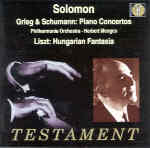Solomon’s 1956 Grieg and Schumann Concertos were reissued by EMI in 1993, and they’re refurbished again here on Testament, although little if any timbral difference distinguishes Paul Bailey’s Testament transfers from Simon Gibson’s on EMI. Testament, however, reproduces the music at a higher level of amplitude, meaning more tape hiss but improved definition in detail. The pianist’s 1948 Liszt Hungarian Fantasy appears in its finest sonic incarnation to date, boasting a wider dynamic range, more cogent sense of room tone, and minimum surface noise from the 78 rpm source material.
Critics writing about Solomon often lapse into tried and true clichés such as “patrician”, “tasteful”, or “refined”, and that’s exactly what we get from the pianist’s Grieg and Schumann coupling. You listen, you respect the pianism’s surface beauty, yet you wonder what’s missing. Perhaps the volatile temperament behind Schumann’s accents and frequent hairpin dynamics, or indeed, the soloist’s restricted mezzo-piano to mezzo-forte dynamic range in Schumann’s second and third movements. In the Intermezzo, for instance, when the violas and cellos sing out their gorgeous C major theme, you can barely hear Solomon’s accompanying triplet figures. Put on Rudolf Serkin’s recording from the same year, and all of a sudden you hear this composition emerge in its fullest chamber-like ideal, with rhythmic power and harmonic tension oozing from every bar.
Herbert Menges, though, provides an enlivened and crisp orchestral framework in both concertos and often uncovers details masked in other performances, especially in the Schumann (in the Finale at letter C, for example, Menges emphasizes the bassoon counterline underneath the syncopated string tutti). By contrast, the piano virtually swamps the orchestra in the Liszt Fantasia’s loudest moments–but what piano playing! Solomon pulls out as many rhetorical stops as he dares without ever turning a cheap phrase or vulgar gesture. And dig his little speedups in the final F major section (the ones that “real” Romantic pianists like Arthur De Greef and Benno Moiseiwitsch take in stricter tempo). It just goes to show how this “patrician” player could thunder to the rafters when so inclined.
































